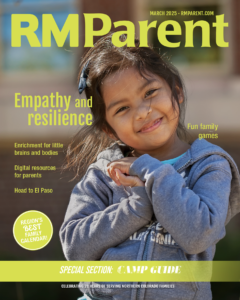Be a better parent
When we are stressed, angry or worried, we’re at our worst as parents. We’re impatient. We’re distracted. Simply put, we are not tapped into ourselves or to what’s right in front of us. Our kids.
When we try to parent from that unsteady place it’s often less than ideal. We don’t listen well. We don’t consider the situation. Instead, we react. Maybe we even snap at our kids. That’s when we need to press the pause button, recognize our emotions, then start again. Digging into what’s behind our stress and fear and revealing our core, authentic selves makes us better parents.
“If we tear away the experiences and trauma of life and get down to the innocence, purity and humanness in all of us, that’s authenticity. Authentic parenting comes from that space of being human,” says Dannie Mironski, MA, LPC, N.C.C., co-owner of Parent-Child Interaction Center, which offers a full range of counseling services for teens, adults, and couples in areas such as stress management, depression, conflict management, anger management, anxiety, and sexuality to families in Fort Collins and Boulder.
So how do we do get authentic and parent from our best selves? Here’s a few ways to start.
Take a time out
A parental time out is stopping and taking a step away, literally or figuratively, from a situation so you can look at it objectively. It’s a chance to check in with yourself to see what you’re feeling and gain understanding about where the reaction on the tip of your tongue is coming from.
“It’s okay to tell your child that you need five or 10 minutes to calm down,” Mironski says. “Start with self-reflection and self-love. Are you being hard on yourself? Not allowing yourself to make mistakes and be human? Feeling fear or anxiety?”
Once you are able to identify what you are feeling, it’s easier to set down your ego and respond from a pure, calm place. Be patient with yourself, it might take time.
“When you can, give your emotions the time they need to simmer. Sit in the discomfort of your emotions. That’s where the power is,” she adds.
Mironski recommends to parents that they identify their triggers. If you know that certain behaviors from your child drive you crazy, the next time they happen you can stop and take a breath to reset.
Teach emotions by sharing emotions
Sharing your emotions sends the message that being emotional is okay, and that we are all human. It helps kids from a young age identify how they are feeling.
“It’s healthy to say, ‘I’m feeling sad right now, but I am okay. I can talk to a friend or Dad about it,’” Mironski says. “When kids don’t know what they are feeling, they tend to have big emotions that come out as tantrums, hitting or kicking, because they don’t know how to process them. So having parents model their emotions and their coping mechanisms is really important.”
When a child is emotional, it’s fine to help them identify what they are feeling. For example, you could say, ‘It looks like you feel frustrated. I see you ripping apart that paper and frowning.’ Mironski says if you get the emotion wrong your kids will tell you.
However, don’t go overboard when sharing your own emotions. You don’t want to spill everything—financial worries, relationship problems—or wallow in your pain in front of your kids. If you do, they might feel like they have to fix you or take care of you. That can only lead to anxiety for them.
Ban the words no, quit, don’t, stop
Do you find yourself saying these words a hundred times a day? Maybe to the point where your kids are not even listening anymore? If so, it’s time to flip those messages from negative to positive.
“Instead of giving a command, tell them what you want them to do instead,” Mironski suggests. “For example, instead of saying, ‘Stop jumping on the couch!’ you could say, “I need you to sit calmly on the couch.’”
Another idea in place of issuing yet another time out—although time outs are fine—is simply helping your child pause and take a step back by saying, ‘Hey, it seems like you are angry right now. How do you feel about going to your room for five minutes?’ Mironski also recommends watching out for times when your child is behaving well and calling it out with specific praise, as in, ‘I really like how you and your sister are getting along, right now. I noticed how you let her borrow your art supplies.’ By playing to the positive more often than the negative, kids are more apt to listen when you talk and respond to your requests.
“You will slip up. That’s natural. It feels easier in the moment to use negative reinforcement,” Mironski says. “As long as your positive reinforcements outweigh your negative ones, you are good to go.”
Say you’re sorry
If you do snap and react to your kids in a way that you are not proud of, be gentle with yourself. After all, there’s no such thing as a perfect parent. Apologizing to your child, or recognizing you made a mistake, is extremely powerful.
“It shows vulnerability, and teaches kids that we can make mistakes and move on from them,” Mironski says. “It also builds trust. Kids recognize that you are being honest and that you respect them enough to set things straight.”
Self-care starts with boundaries
We all know the airplane oxygen mask concept—you have to first take care of yourself before you can take care your kids. Maybe along the way you got the message that your kids should always come first. For a family to function healthily, parents must come first, and then the kids.
“The number one question I ask parents in therapy is, ‘Who comes first in your house?’ I often hear, ‘The kids.’ If the kids come first, or if everyone is even, it gets messy. The healthiest order in a family is the individual adults at the top, then the couple, and then the kids,” says Dannie Mironski, MA, LPC, N.C.C., co-owner of Parent-Child Interaction Center.
To maintain that hierarchy, set boundaries. Start with physical ones. You have a bubble around your body, and you are in charge of that bubble. Your kids have bubbles, too. Permission is needed to cross into each other’s bubbles. Teaching these boundaries helps eliminate kids climbing on your head or siblings getting into each other’s faces.
Next, draw clear lines between adult topics and child topics—blurred lines here can make kids feel anxious and overwhelmed because they don’t know how to handle adult concerns. Also, be aware of your own needs for self-care so your children don’t feel like they have to fill what they perceive as missing.
While you are at it, establish a regular daily schedule with a set bedtime, homework time, and play time so life is predictable and safe. Finally, commit to taking time regularly for yourself and together as a couple. After all, the airlines got it right.

Lynn U Nichols is a longtime Fort Collins-based freelance writer who specializes in health and wellness content. She raised two boys while writing for RM Parent Magazine, gratefully applying the wisdom she gleaned from interviews with child experts along the way. Learn more at healthwritecommunications.com.




